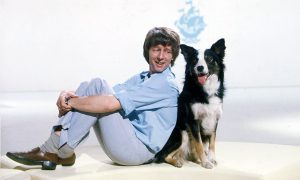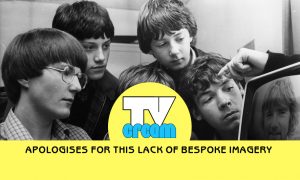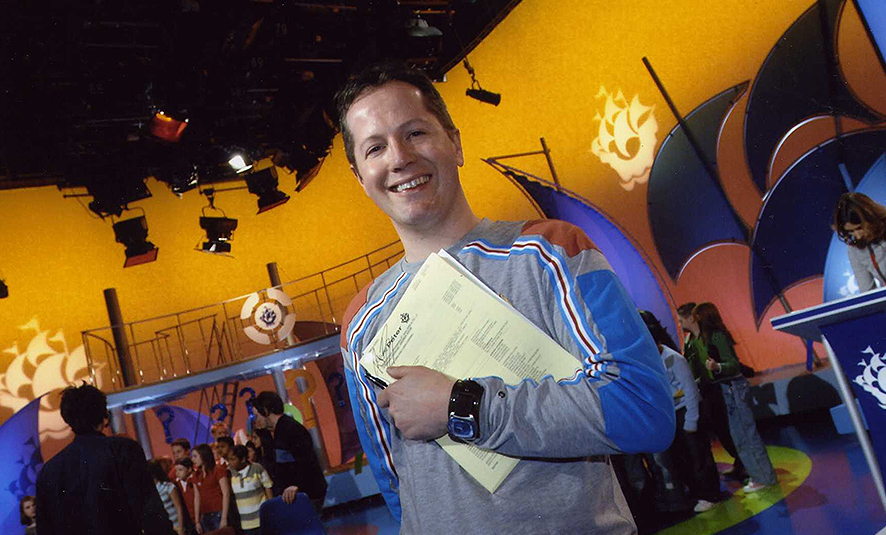
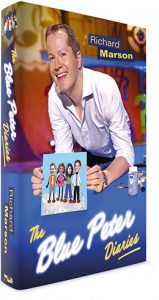 Hello again!
Hello again!
This is part two of our chat with Richard Marson, former editor of Blue Peter, whose new book, The Blue Peter Diaries is out now, and highly recommended.
Last time, Richard told us why he decided to release his memoirs, and what Matt Baker had to say about the endeavour. He also talked about how Stuart Miles was affected by the sacking of Richard Bacon, and his philosophy for putting together a perfect team.
Now read on, for our final part.
![]()
Konnie Huq, Matt Baker, Simon Thomas and Liz Barker was a line-up every bit as good as a Val, John and Peter or a Simon, Sarah and Peter…
Absolutely. Well, my view is that my dream team were genuine, whereas Val, John and Pete were acting. I think there’s a big difference. They did it brilliantly, because they were all actors – but also, Val, for all her incredible competence as a presenter, she wouldn’t get a job now. Times have moved on. Whereas if Noakes were around today, he would. Noakes was a genius. He had that ability to come over as a real person, but he was acting. All presenting is a heightened version of yourself, but the best presenters are not acting. They’re giving you a projection of who they really are. Val, John and Pete were tightly controlled, so therefore you got much more of the Blue Peter [clipped] ‘Well, that was very interesting!’ We had moved on from that. But then I suppose I would say that. I grew up with that era. You see, to me, when Lesley Judd came in, the reason I really liked her was she felt much warmer and more accessible than Val. Val was like a headteacher. I would have been really scared to meet Val, but I would have been very happy to chat away to Lesley. I used to love watching my team go anywhere there were kids, to see how the children responded to them. They would flock around Konnie, and, funnily enough, later around Zoe, for all the fact that some people accused her of being cold because of the way she looked. As The Guardian famously said, ‘The life-size Barbie doll’. But that’s very appealing to a lot of little girls. They flocked to her. Simon would be more – they would want to get his attention, but they would shyer, because he was a slightly sterner older brother figure. And there’s room for all of that in the mix, because it’s all useful.
Writing about Gethin Jones in the book, you record he initially struggled on screen.
He had a really tough time. And bearing in mind it was six months from when he first came to see me [for an audition]… I said to him, ‘You were like the water on the stone – you wore me down’. I think it’s interesting that really the thing that pushed him over the line was his persistence. Again, that’s a key factor, if you look at a lot of Blue Peter presenters: Simon auditioned three times. And there was Katy. These were people who had been told, unequivocally, ‘You’re not going to be a Blue Peter presenter, go away.’ I often think, ‘Would Matt Edmondson had got the job instead of Andy [Akinwolere] if he’d not taken my no? If he’d kept coming back to me?’ Matt Edmondson has had a great career – but I still didn’t think he was right for Blue Peter at that point in his life.
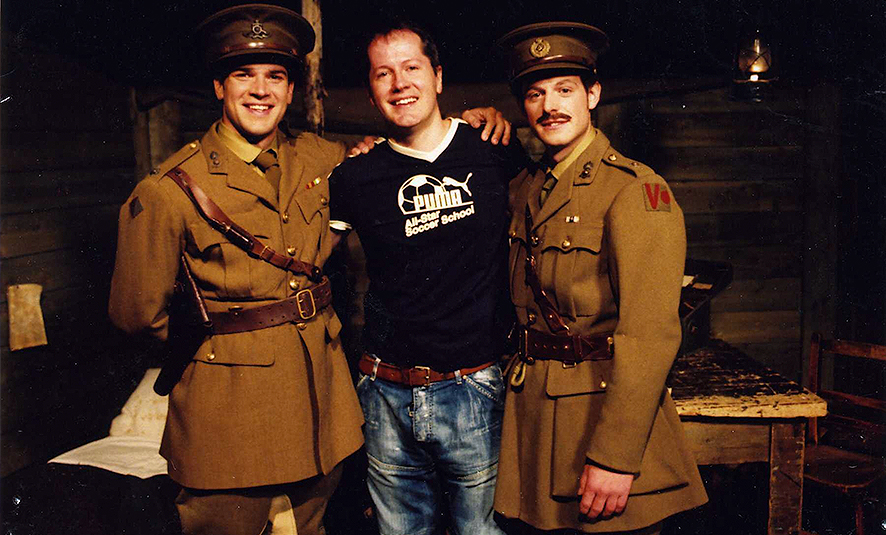
What are your thoughts as an editor, when you bring someone in who, potentially, is not working?
You have to have enough faith in them. His original audition had been sunk by a terrible ‘make’. His make was atrocious. And I worried he had a boring voice. But it was significantly more boring when he was droning on about making a Christmas card than it was when he was on the trampoline. I thought, ‘If I like his other qualities,’ which I did, ‘maybe he just doesn’t do the makes’. It goes back to playing to their strengths. Could I give Gethin a make? When I did, generally, they were pretty bad. He did a couple, not very many. But Konnie loved them, she was itching to do them. And Liz liked them too. I did sometimes think, ‘Well, the boys have got to do them!’ Matt was fine, Gethin, not so much. Gethin’s great plus to me was that he absolutely understood Blue Peter. He never took for granted what Blue Peter was. He really worked hard for the audience. He wasn’t cynical. There was nothing cynical about his approach. The big frustration about Matt not getting Gethin, is I think Matt never got beyond the fact that Gethin is very good looking. Matt just thought, ‘He’s a male model, he’s fake…’ Matt’s ego is tied up in what he can do, physically, not in how he looks. Whereas Gethin, you could see Gethin modelling on one of our morning recording dressing-up items and enjoying it a bit too much – as Matt would say.
Does it matter, really, if presenters don’t get on?
No. On screen you would never have known with Matt and Gethin. Not in the least because Gethin sort of hero-worshipped Matt, so he was like a little puppy. And with Zoe and Gethin, people used to say to me, ‘They’re going to get married, aren’t they? They’re obviously an item’. And I thought, ‘If you only knew how they’re so not an item and never will be.’ Zoe had this kind of uncanny steel about her, that I actually feel… this is one of the things about writing the connective material and pulling it all together in the book – I really thought about this. Zoe, in a way, suffered from a huge amount of sexism, that men could not deal with the fact that she was not biddable. To some extent, Konnie and Liz were much more typically female and feminine, in that they would be charming, flirty… Their femininity was very obvious in how they worked. Zoe was like, very cool. She wanted people to be direct with her. She wasn’t interested in a love-in. And she certainly wasn’t giving it away with a bar of a soap. She didn’t want to please everybody. She wasn’t desperate to be liked, I don’t think. Not that she didn’t want to be liked. Gethin’s not so much an alpha male, but he’s a traditional boy. I think he couldn’t understand a girl who wouldn’t flirt back. Who would slap him down, who just wouldn’t be interested. And that happened in the production team as well. She worked absolutely the best with the producers who would have said, ‘That’s crap – you need to do this, you need to do that.’
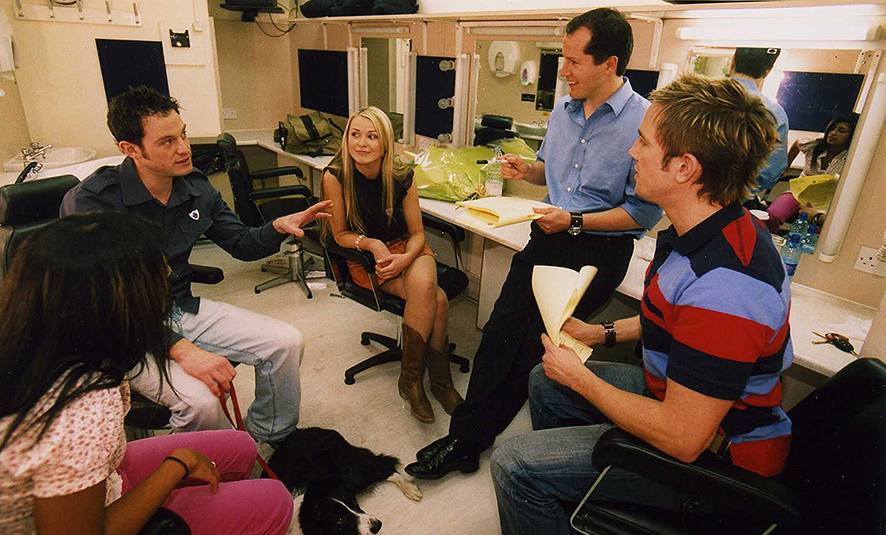
She had a self-possessiveness.
Absolutely. She was a very bright – is – a very bright, determined woman. She had paid for her own law degree, going through a top university, by modelling. She got absolutely slated for that. As she said, ‘If I’d worked in a café, no one would have raised an eyebrow.’ But working in a café can be just as sexist an environment. People didn’t like that, they didn’t like the fact she wasn’t apologising for having long, blonde hair and liking to wear pretty dresses. But she happily did all the horrible things. I did play against it, because I thought for her benefit, people need to see that she’s willing to empty the bins. I think the difference with Zoe was that maybe she didn’t have a warmth that some of the other female presenters had.
Do you mean a TV warmth?
Yes. Something that the audience would pick up on. But I used to say, if you had four presenters, you could afford to have one who isn’t… Like, we had Simon who was not naturally warm. He was sort of a drier presence, but with Matt next to him or Konnie next to him, it worked a treat. Put Zoe next to Gethin… that’s why they worked on screen, and why people said, ‘Oh, they’re going to get married’. But Gethin would come to me: ‘She does my head in!’ I used to say to him, ‘She’s not said a word to me. Funny how the only complaints I’ve had are from you.’ And you’d see him go, ‘Oh’. They all used to come to me, it was a very parental role.
In the book, you reveal that during Gethin’s audition process, another TV presenter called you up, claiming he was gay(!). However, would that have even been a problem for you? Could Blue Peter have an openly gay presenter?
Yes. Why not? It would have been a much happier experience for Stuart [Miles], obviously. Gethin could have been gay, could have not been gay. Who cares? Potato, po-tart-o. If he had been gay, I would have cast him. I would have had no problem with it. And if he had a civil partnership I would have featured it on the show. In the same way we featured Katy’s wedding and Simon’s wedding.
And Liz’s kids.
Absolutely. If they’d chosen to adopt, as, obviously, a lot of gay couples do now, it would have been a great Blue Peter story.
Would you have had resistance within the BBC?
Erm, no, probably not. But I think we would definitely have had to deal with resistance from the audience, in the same way we had to deal with people writing in saying, ‘It’s not right that Liz is bottle-feeding her baby’. That’s tricky, because the more you make in-roads into a presenter’s life for the telly, the harder it is for them, because they’re having to defend their lifestyle.
Also in the book you talk about how Konnie would never read a script…
Oh, Konnie! So where Konnie did my head in, always, was, like a lot of very intelligent people, she’s quite lazy. In our films, she would like the story, she’d want to commit to it, but she’d expect to use the first four takes as a line rehearsal. And you didn’t have the time. It used to drive me mad! It’s no surprise to me, the connection between her and Charlie Brooker. They’re both very bright people. The difference is Charlie is very industrious. On a one-to-one basis, I used to find her so much fun, and actually without a nasty side. She was gossipy, she liked the gossip, but she wasn’t poisonous. There was no malice, and I think that, again, is relatively unusual in someone who’d achieved what she’d achieved. She was actually a bit of a girl guide.
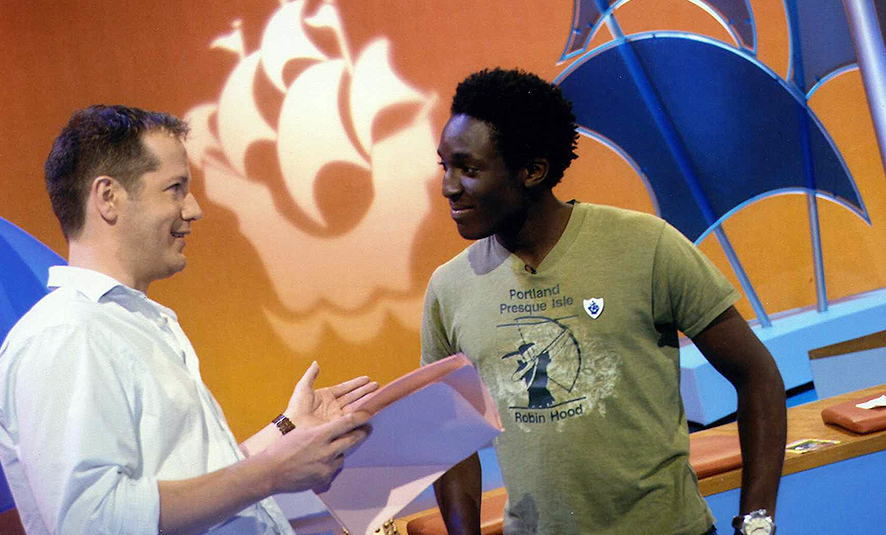
Your downfall on Blue Peter came as the BBC were introducing their Creative Future ‘blueprint’. You’re rolling your eyes as we mention that, Richard.
Don’t hold me back! Even coming up with a phrase like ‘Creative Future’ instantly makes the spirit die a bit, doesn’t it? I sat in what we used to call the Nuremberg Rallies. Sitting in these conference rooms, all at huge expense. Everyone working on programmes. I was always very conscious of the fact it was cut, cut, cut, cut, cut on one side, but money no object when it came to carafes of spring water and windbags standing up and outlining how they felt. There were some key findings that related to children’s programming that I violently disagreed with, not least the aging down of the audience. It wasn’t even they were saying, ‘Let’s go to eight to 12, for the CBBC channel,’ which might have been the right decision. It was the lack of provision for the ‘customers’ of the BBC between the ages of 12 and 18. I felt that was a really serious mistake. Just basically telling those people from 12 upwards, ‘Fuck off, you’re not wanted anymore’. That was not good.
In 2007, you were moved on from Blue Peter to work on other CBBC projects, following a ‘fake’ phone-in scandal. But then, after a BBC-wide inquiry into all competitions, they sacked you for – back in January 2006 – changing the results of an internet poll to name the Blue Peter cat.
I was ‘sensationally axed’.
Is that the phrase we use?
I used to joke a lot about ‘sensationally axed’ because it’s such a tabloid phrase. Then, one of my crueler friends, when it happened, said, ‘I notice in the headlines it says you’ve been axed.’ It was like, ‘Blue Peter boss Axe.’ I said, ‘Sadly, not “sensationally”.’ It was a lighter moment in a not very nice time. I do thank God for a sense of humour. Not that I believe in God. But I do feel very thankful, because I think that is a real ally. You can lose so much sense of proportion. As my grandmother said, ‘If you don’t laugh at yourself, you’re missing the best joke of all’.
Talk us through the cat debacle.
It was a vote on the Blue Peter website. I chose five potential names from suggestions that came in that people could vote on. So, going by that logic, I was happy with any one of those five names. It really wasn’t a big deal at the time, and it certainly wasn’t hushed up.
Cookie was the winning vote, but you switched it to Socks, because you were concerned there was a suspicious spike in the polling.
There had been, although I hadn’t got any hard evidence. But I was told at the time there was no way of the software knowing if a certain computer had already registered a vote. Therefore you could, in theory [taps repeatedly, as if voting again and again]. I mean, in one respect, I suppose, does that really matter? But that’s what we argued about at the time. However we weren’t going to go on air and say, ‘Oh, we’re changing it because of this reason.’ You’d bore the arse off most of the audience, and also we weren’t going to say, ‘Oh, the interactivity part of this is a bit suspect,’ because you’re completely undermining the point. Also, no money was involved. The voting mechanism didn’t even involve 10p. When it all came out, there was speculation we thought it was promoting an unhealthy lifestyle, because cookie is the American word for biscuit. Or that cookie’s a sexual slang. Journalists were understandably inventing these things in the absolute absence of any rational explanation. I remember a couple of them phoning me up to say, ‘We just really don’t understand it’. And I said, ‘I don’t understand it either.’ As for the BBC sacking me, my suspicion is – I’ve got absolutely no evidence – they just thought, ‘Do you know what? This guy really pissed us off with that phone-in thing. His head is going on a plate, post-haste.’
Meaning, it was something that was convenient for them?
Well, I think the danger with all of this sort of thing is that you can sit there, either at the time or after it, kind of inventing… because I don’t know. I don’t want to speculate, because it gets you nowhere. And, to be honest, you know, without being too crude about it, because of what happened to me afterwards – in terms of what happened in the family – the biggest regret I had about it was the amount of time I devoted to it. Because, I didn’t know at the time that my son only had a few months to live. I was very upset, miserable, and also involved in interminable negotiations with the BBC about my exit. Which… it took about eight or nine months. And then he was dead shortly after that. I looked up and thought, ‘Rather than wasting all those months on something that really wasn’t helping anybody…’ and you can’t get that back. It sounds like an obvious thing to say, but, you know, when something that appalling happens in your life, you’d be very strange, very sociopathic, if you didn’t realise, ‘Okay, you have to have a sense of proportion about these things.’ It also has a farcical aspect to it. Again, your sense of humour has to be triggered in some way, because, only in Britain – only at the BBC – all of those things apply. I still get people who don’t know me from Adam, and they’ll mention it in conversation. ‘Do you remember that thing with the cat? Wasn’t it really weird?’ I don’t think I’ve ever met anyone in the industry who’s been able to articulate that they thought something really bad had happened. You know. And so it was odd.
Rupert’s death is referred to in the book. Was that a difficult decision?
I talked to my wife, I talked to my daughter. He was massively into Blue Peter and so you can’t airbrush it out. I wasn’t going to put a photo in, but Matt West [of Miwk] said, ‘I think you absolutely should. It would be strange not to’. And so I think… I think I’m comfortable with him being part of it, because he was part of it. I just wish it had a different ending. I know that sounds obvious. I suppose one of the sadnesses of looking back at that time – apart from maybe that last year or so – was that I was so happy. People very rarely are, and, whatever else, I have never lost sight of the fact that, to be someone who was able to do their dream job – that’s so lucky. And that it measured up! I think sometimes people get there, and they think, ‘Be careful what you wish for,’ and they don’t like it. But I thought it was amazing.
![]()




